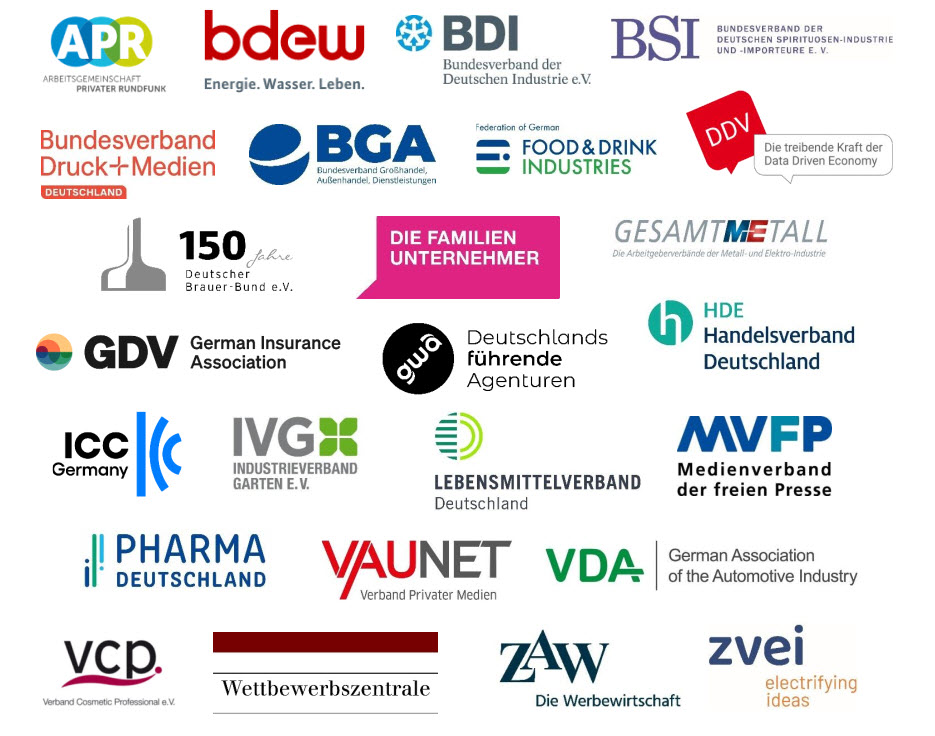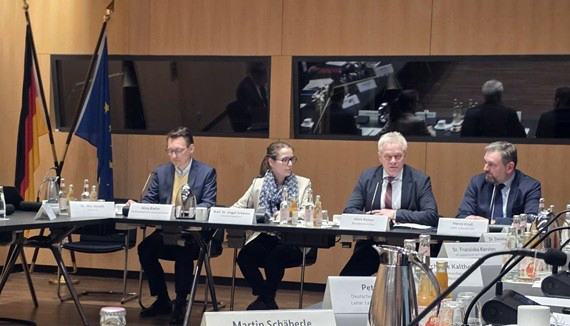 Quelle: BVE
Quelle: BVETo the attention of Ambassador Søren Jacobsen, Deputy Permanent Representative, Danish Presidency of the Council of the European Union
Subject: Request to the Council Presidency Not to Resume Discussions on the Green Claims Directive
Dear Ambassador Jacobsen,
8 July 2025
The undersigned associations, representing a significant share of the German economy, continue to follow developments surrounding the Green Claims Directive (GCD) with great concern.
We welcome the fact that the proposal no longer holds a majority in the European Parliament and the Council, as it would have led to excessive bureaucracy in the Member States—without delivering tangible benefits for either consumers or the environment. For this reason, and for those outlined below, we respectfully urge you to promote the suspension of the dossier during your presidency.
Symbolic exemptions do not solve real problems
The exemption currently under discussion for micro-enterprises would have little to no practical effect. Most micro-enterprises operate in local retail or crafts and do not make complex environmental claims. They would hardly be affected—making the exemption largely symbolic.
Meanwhile, the significant burden on small and medium-sized enterprises (SMEs) remains unchanged, particularly due to extensive pre-certification obligations and bureaucratic documentation requirements. This undermines efforts toward SME-friendly regulation and sends a damaging signal for the European economic area.
Lack of evidence and serious deficiencies in the impact assessment
There is still no independent, robust impact assessment specifically for the Green Claims Directive. The Commission merely refers to the impact assessment of the EmpCo Directive, despite both initiatives differing significantly in objectives and regulatory intensity.
Key issues include:
• There is no solid evidence proving that pre-certification or communication bans, as foreseen in the GCD, are necessary or effective.
• The proposals rely on outdated data from 2020, speculative assumptions, or subjective estimates from market participants with vested interests.
• Cost forecasts for pre-certification are inconsistent, non-transparent, and methodologically questionable.
• Legal uncertainty persists: Certificates of conformity have no binding effect on courts or authorities.
• Two recent court rulings demonstrate that existing legal frameworks, such as the Unfair Commercial Practices Directive (UCPD), are already effective in protecting consumers from unsubstantiated or misleading green claims.
These weaknesses starkly contradict the principles of the Commission’s „Better Regulation“ initiative, which calls for legislation to be evidence-based, proportionate, and practical.
Simplified procedure without simplification
The so-called „simplified procedure“ that was under discussion in the trilogue provides no real relief. On the contrary: it is vague, administratively burdensome, and legally uncertain. The conditions for applicability—such as the exclusion of climate-related claims or unclear documentation requirements—severely limit their practical usefulness.
Genuine self-declaration is virtually impossible, as the evidence requirements remain extensive and unpredictable.
Relation to the EmpCo Directive
The Directive on empowering consumers for the green transition has already introduced a high level of protection against misleading environmental claims and is to be transposed by March 2026. Any additional regulation before assessing its effectiveness would not only be premature but also legally questionable.
The GCD represents a deep intrusion into freedom of expression—without sufficient justification for the severity of the interference. A legally mandated pre-certification—combined with unclear procedures for self-declaration—constitutes an unjustified encroachment on entrepreneurial and commercial freedom of speech. It is neither necessary nor proportionate.
Conclusion
Given the serious flaws in the concept, data basis, and regulatory architecture of the GCD, we strongly urge you to not continue the trilogue process. An exemption for micro-enterprises is not sufficient to make the directive viable. Instead, it threatens to become a bureaucratic burden that disproportionately affects the very companies that are vital to the green transition. Moreover, the initiative has lost the political support it requires.
Sincerely,
Oliver Zander
Director General
Arbeitgeberverband Gesamtmetall e.V.
Transparency Register No: 03004067068-71
Prof. Dr. Holger Paesler
Managing Director
Arbeitsgemeinschaft Privater Rundfunk (APR)
Transparency Register No: 97718327188-10
Viola Rocher
Managing Director EU-Representation
Bundesverband der Energie- und Wasserwirtschaft e.V.
Transparency Register No: 20457441380-38
Holger Lösch
Deputy Director General
Bundesverband der Deutschen Industrie e. V. (BDI)
Transparency Register No: 1771817758-48
Angelika Wiesgen-Pick
Managing Director
Bundesverband der Deutschen Spirituosen-Industrie und -Importeure e. V. (BSI)
Transparency Register No: 71253121277-71
Julia Rohmann
Environmental Protection / Occupational Safety Officer
Bundesverband Druck und Medien e. V.
Transparency Register No: 239421352786-10
Antonin Finkelnburg
Director General
Bundesverband Großhandel, Außenhandel, Dienstleistungen (BGA) e. V.
Transparency Register No: 185689791629-60
Marcel Winter
Head of BVE Brussels Office
Bundesvereinigung der Deutschen Ernährungsindustrie e.V.
Transparency Register No: 700829026603-04
Daniela Henze
Head of Public Affairs and the Berlin Office
DDV Deutscher Dialogmarketing Verband e. V.
Transparency Register No: 746834522404-78
Holger Eichele
Director General
Deutscher Brauer-Bund
Transparency Register No: 50878746386-39
Dr. Daniel Mitrenga
Member of the Executive Board | Head of European Policy Department
DIE FAMILIENUNTERNEHMER e.V.
Transparency Register No: 086648916736-69
Jörg Asmussen
Chief Executive Officer, Member of the Executive Board
GDV – Gesamtverband der Deutschen Versicherungswirtschaft e. V.
Transparency Register No: 6437280268-55
Dr. Ralf Nöcker
Director General
Gesamtverband Kommunikationsagenturen GWA e.V.
Antje Gerstein
Managing Director
Handelsverband Deutschland – HDE e.V.
Transparency Register No: 31200871765-41
Oliver Wieck
Secretary General
ICC Germany e. V. Internationale Handelskammer
Anna Hackstein
Managing Director
Industrieverband Garten e.V.
Transparency Register No: 647151635726-29
Christoph Minhoff
Director General
Lebensmittelverband Deutschland e. V.
Transparency Register No: 583851318567-80
Prof. Dr. Christoph Fiedler
Managing Director for European and Media Policy
MVFP Medienverband der freien Presse e. V.
Transparency Register No: 876509717508-94
Dorothee Brakmann
General Manager
Pharma Deutschland e.V.
Transparency Register No: 945120918083-26
Daniela Beaujean
Managing Director
VAUNET – Verband Privater Medien e. V.
Transparency Register No: 530146591621-49
Martin Ruppmann
Managing Director
Verband Cosmetic Professional e.V.
Transparency Register No: 438063816019-93
Jürgen Mindel
Managing Director
Verband der Automobilindustrie e.V. (VDA)
Transparency Register No: 95574664768-90
Dr. Reiner Münker
Executive Member of the Presidium
Zentrale zur Bekämpfung unlauteren Wettbewerbs Frankfurt am Main e.V.
Transparency Register No: 241125238825-58
Dr. Bernd Nauen
Director General
Zentralverband der deutschen Werbewirtschaft ZAW e.V.
Transparency Register No: 12238962750-40
Dr. Wolfgang Weber
CEO
ZVEI e. V. Verband der Elektro- und Digitalindustrie
Transparency Register No: 94770746469-09



